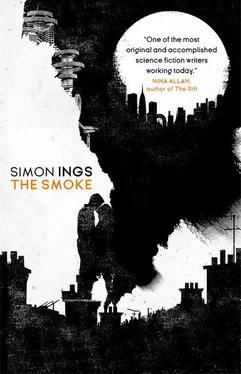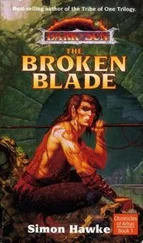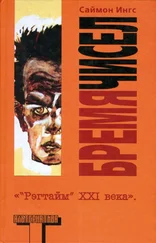His fingers – do you see them? – are thick and worn and covered in white dust: powerful hands, the fingers held slightly apart. Imagine the muscles of his fingers, too, trembling, swollen with blood from some intense physical exertion!
Let your gaze move slowly, intensely, from the tips of the man’s fingers, to his wrists, to the complex tattoo, already so old as to be blue and faded, that runs up his forearm: a set of cantilevered bars that stand in for the pumped musculature running beneath the man’s honey-coloured skin.
The tattoo disappears under the man’s jersey but don’t let that stop you. Let your gaze continue to rise, as you speculatively sketch in the forms and images that lie under the fabric. You’re up to the man’s neck, now. See the stubble there? It’s darker than the hairs on his arms. Keep going. That’s it. Up, past the youth’s strong chin, to his eyes and there : they lock tight on your own.
Your breath catches in your throat. Are you afraid? Why are you afraid? Look: the man is smiling. Such a burst of liquid warmth under your skin! You want to leave your seat, not to give it up for the man, but so that you can stand beside him, bathing in the light cast by his smile. To be any distance at all from that smile, even a few feet, is unbearable.
You’re just in the act of rising when you notice the young girl, the student – perhaps she is still a schoolgirl – and she, too, has seen the young man’s smile. She, too – it’s obvious – has seen the quality of it, the unusual intensity. Now she turns casually to see where that smile is directed, and as she turns, her backpack swings awkwardly against the small of her back and her shoulder performs a small, compensatory shimmy, keeping the straps in place. Gaze at her shoulders, her chest; measure the subtle acts of balance by which she turns yet keeps the bag on her back! The contrast between the subtle cybernetics and the frank invitation of her small, high breasts is heartbreaking, don’t you think?
And, though he’s paying no particular attention to anyone, something about this moment must be brushing the consciousness of the Indian businessman, whose closed eyes and flaring nostrils suggest that he is experiencing the onset of a spell of profound concentration. A beatific smile spreads slowly across his face, first as a pout, then a wave of relaxation that transforms his whole appearance, softening every wrinkle, every frown-line, before spreading to his shoulders, his back, even to the girdle of his hips, so that he seems without moving to grow, to unwind, his stoop and rounded posture gone, his belly not a burden but a part of him now, integral to this new shape as it emerges from its unathletic original.
Now the girl is watching the businessman very closely. Without even moving his head, the man opens his eyes, gazing deeply into the girl’s eyes, so intensely that she blushes, the colour bringing life to her sallow cheeks before spreading prettily to her neck and even so far as her breastbone, and perhaps she feels the heat there, the power of that strong, involuntary flush, because she reaches a hand to her throat and her fingers linger there, and it seems in that instant as if she is caught between contrary impulses: to shield herself modestly from the businessman’s smile, and at the same time to asphyxiate herself, stopping her breath so that her eyes might roll in ecstasy back into her head.
Sensing a crisis, the young builder shifts his weight onto one leg, his arms forming an encircling arc, as though to embrace the girl. This motion catches the eye of the businessman, whose admiring gaze explores the young man’s face, and the three move towards each other in a single, sweeping embrace. You drop your newspaper between your feet. You have to join them. You have to. But you can’t, the woman next to you has her hand on your thigh, her grip is like a vice, and her other hand is between her legs, lifting her skirts, revealing the smooth, full black flesh of her thighs, and even as you lean into her, toppling into her lap, the whole carriage gives a sickening lurch, and the blind black windows, caught in mid-tunnel, erupt suddenly with colour and motion.
Behind the mother and son sitting opposite you, entwined and kissing, something appears.
It is a mouth, pressed against the window, suckered there, its needle teeth tip-tapping on the glass.
A second later, it is torn away and a rain begins of limbs and eyes, the soles of feet, of scrabbling hands and spoon-shaped privates and grazed, bluish knees. Excuse us! Coming through!
All the chickies of the city are flooding past the carriage. There are thousands of them, piling one atop the other in the urgency of their passage. The horizontal rain hammers at the glass and keeps on hammering and hammering; there is no end of them. They’re no threat, trust me, they’re not trying to penetrate the carriage. They just need to get past.
But why?
The answer’s there before you, quite literally in black and white. ATTACK.
The chickies know. They know what’s coming. And they’re afraid. Hell, they’re terrified.
And it comes to you (though on a great calm wave of acceptance, so that it does not feel like a thought at all, but rather a change of perspective, a slight but significant shift in the meanings of things), that your own relaxed acceptance of this sight is of a piece with that peculiar, subaqueous episode just now with the student and the businessman and the builder.
And you wonder – without drawing any particular hard and fast conclusions – about the strange sexuality of these chickies, so abject in their self-abnegation, so strong in body, yet in mind, so weak!
And it comes to you – again, without the slightest trace of shock or fear – that this is bullshit. That we know exactly what we’re doing, and that it’s you, you who are being manipulated. And that it’s not just you. It’s everyone. And that this manipulation has been going on for some while – perhaps ever since that day, half a century ago, when chickies rose out from the dead and crawled their way up through the Somme’s thick, stinking, bloodied mud, and saw the world, and saw inside the world, and saw inside the heads of everyone on Earth, and laughed their bright, needle-mouthed laughs, and said, as one,
LET’S HAVE SOME FUN!
, you have lost your sense of time. Aware that the train is not moving, you experience a lurching moment of panic. After all this while, have you somehow missed your stop? But no: the train is even now pulling into Holborn. You work your way as politely as you can out of the crowded carriage onto the platform, where colour-coded signage leads you to the far end of the platform, a flight of steps and a subterranean concourse ventilated by a large blue fan behind a grille.
Another corridor – the same white-painted tin, the same movie posters, Stanley Baxter, James Robertson Justice – and a spiral stair lead you to the Central Line and, after barely a minute’s wait, an eastbound train arrives to carry you to Saint Paul’s.
From here it’s just a short walk to the Barbican.
At Moorgate Station, you find crowds gathering in silence. Moorgate itself, a road which meanders in and out of Bundist territory its whole length, has been closed to traffic. Today, though, it is anything but a no-man’s-land. Quite the reverse: you see the ageless, bony-faced men and women of the Bund mixed in amid this crowd, who look as though they might have toppled out of the taproom of the Foresters. There’s no argument. No jostling. No confrontation or muttering. There’s nothing. People are moving en masse across the road towards Finsbury Circus, where the crush is less and the engineered baobab trees afford some screen against the sun. People are trying to see. People are trying to work out what is going on. They are looking up, all of them, in the same direction. They are looking at the Moon, pale in the bright and cloudless day, and circled – this is by now unmistakable – by a white sclerotic ring of stuff, like a wild and ancient eye.
Читать дальше












